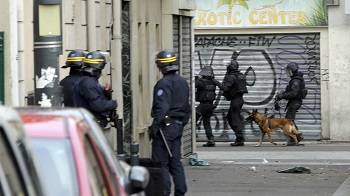As security forces in France and elsewhere in Europe hunt those involved in Friday's coordinated attacks in Paris, conspiracy theories have been taking root online attempting to provide an alternative explanation for what happened.
ISIL claimed responsibility for the shootings and suicide bombings at a number of locations across the French capital, which killed 129 people and wounded hundreds of others.
France has not hesitated in placing blame squarely on the armed group, and has upped its bombing campaign against ISIL in Syria in response.
But that has not prevented the spread of conspiracy theories online purporting to offer evidence disputing the accepted account of what happened.
On YouTube, several videos published shortly after the attacks claiming to expose the alleged "hoax" have picked up hundreds of thousands of views each.
Many who doubt the official narrative have focused their attention on the French police's discovery of a forged Syrian passport believed to have been carried by one of the suicide bombers who blew himself up outside Stade de France.
Some Facebook and Twitter users questioned how a passport the attacker was carrying could survive a blast, given it was made of paper.
Memes that spread shortly after the attacks suggested that passports should be used as body armor given their supposed resistance to explosives.
Al Jazeera spoke to explosives and forensic experts, who offered an explanation for how a paper document could survive a suicide blast despite close proximity to the bomber.
Philip Gill, an expert on explosives and munitions at Cranfield University in Bedford, England, said a bomb of the type suspected to have been used would normally only destroy materials directly in contact with it.
"If the passport might have been in a backpack or coat pocket, the distance would have been far enough for it to avoid the initial intensity of the blast," he said.
"A good way of thinking about most explosive materials is as a wave generating a lot of rapidly expanding gas, which isn't necessarily going to combust materials it comes into contact with.
"The Hollywood representation is not true … it might shred materials and push them, but it wouldn't necessarily set them on fire," Gill said.
John Bond, a lecturer in Criminology at Leicester University and former police forensic expert, told Al Jazeera the shockwave created by the explosion would simply carry away small objects such as passports provided it avoided coming into contact with projectiles.
"In the case of a passport, if it escaped being damaged by material projected by or from the explosion, then I would expect it, being fairly light and flexible, to be carried along by the wave emanating from the explosion," said Bond.
Beyond skepticism about how the passport survived the blast, one piece of purported evidence used by the conspiracy theorists has been harder to explain.
Two days before the attacks, a little known Twitter account with the handle "PZfeed" posted a tweet that appeared to show foreknowledge of the attacks, with a death toll remarkably close to the one in Paris.
"BREAKING: Death toll from Paris terror attack rises to at least 120 with 270 others injured," the tweet dated November 11 reads.
The post has clocked nearly 10,000 retweets since the attack and has been seized upon by conspiracy theorists.
However, users on Reddit have offered an explanation on how such a seemingly prescient tweet could have come about.
User 'burningempires' pointed out the account appeared to be a bot randomly merging headlines from news stories.
The account had merged a headline about the attacks on Charlie Hebdo's Paris offices in January, with one about an attack on a mosque in Nigeria last year that left more than 120 people dead.
The publication of the tweet so close to the attacks appears to be a coincidence.
The appearance of conspiracy theories after attacks such as the one in Paris last Friday is not a recent phenomenon.
The attacks on New York and Washington DC on September 11, 2001, gave rise to the "truther" movement, which accused the US government of complicity in the attack. A similar movement formed after the attacks on London in 2005.
Social psychologist Karen Douglas from the University of Kent told Al Jazeera such ideas emerge from a sense of uncertainty after tragedies such as Paris.
"Conspiracy theories may allow people to regain a sense of power because they provide a concrete explanation for what might have happened.
"They emerge for such events maybe because the events are so significant that only large explanations will seem satisfactory.
"Explaining the events as the result of a terrorist group does not seem as justified as explaining it as the acts of much larger groups such as governments. This is known as the proportionality bias."
Viren Swami, a lecturer in psychology at Anglia Ruskin University, told Al Jazeera questioning details of an event should not be conflated with a conspiracy theory.
"Questioning how a paper document survived a blast seems to me like a fair question. Suggesting that the Paris terrorist attacks were a false flag operation, on the other hand, does fit the description of a conspiracy theory.
"Why do conspiracy theories emerge so quickly?
"In the aftermath of stressful and traumatic events such as the one in Paris, some people may prefer explanations that either fit their worldview … or provide a simplistic explanation of something that is otherwise very difficult to comprehend."
PHOTO CAPTION
French police launch raids to capture suspected accomplices on Wednesday
Al-Jazeera


 Home
Home Discover Islam
Discover Islam Quran Recitations
Quran Recitations Lectures
Lectures
 Fatwa
Fatwa Articles
Articles Fiqh
Fiqh E-Books
E-Books Boys & Girls
Boys & Girls  Ramadan
Ramadan Fatwa Audios
Fatwa Audios Month of Mercy
Month of Mercy Women
Women Eed Al- Fitr
Eed Al- Fitr Food Recipes
Food Recipes Videos
Videos

 Prayer Times
Prayer Times












